




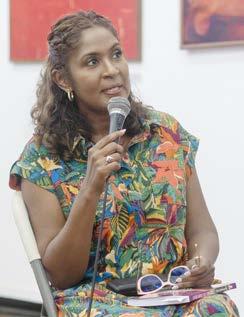
Celeste Mohammed, Award-winning Trinidadian writer using her work to preserve Caribbean voices and shed light on violence against women (Yohan Savory photo)
By Shaniya Harding
The storytellers, poets, and writers of the Caribbean are as unique as their works and the stories they tell. The Caribbean region has given rise to some of the world’s best works and writers, and in Guyana, writing is an ever-evolving art form. Last week, Guyana hosted the Guyana Literary Festival as part of celebrating the winners of the Guyana Prize for Literature.
This year’s festival also welcomed some of Guyana’s and the Caribbean’s most notable literary voices. From books that bend time and reality, like Jasmaine Payne’s LEECH, to Celeste Mohammed’s Ever Since We Small, a story of a turbulent family told from the perspective of the trees, and Alison Donnell’s Lost and Found, which revisits the Caribbean’s best but forgotten writers — this year’s festival was a celebration of Caribbean excellence, pride, and identity.
Telling a Unique Story:
Jasmaine Payne’s Debut Novel LEECH
LEECH is a book that will have you intrigued — but far too immersed to put it down. Written by Guyanese author, editor, and communication specialist Jasmaine Payne, LEECH breaks new ground for both Payne and Guyana’s literary landscape, as it marks the first psychological thriller written by a female author based in Guyana.
Payne, whose career in writing began at just eleven years old and includes more than 15 years of journalism experience and over eight years as a professional editor, described LEECH as an immersive adventure that takes the reader through various timelines, beginning in 1800s Britain and making its way to modern-day New York. The book revolves around the ideas and passions of its titular character, John Thomas Reginald Leech, who — in a search for greatness he could not achieve during his lifetime — seeks immortality more than 100 years later
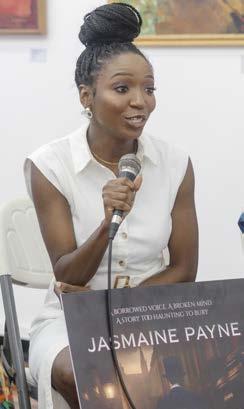
Jasmaine Payne, Guyanese author and editor, whose debut novel Leech explores obsession, recognition, and the art of storytelling (Yohan Savory photo)
through struggling writer Arianne Smith, a character inspired by the author. The characters tell a story filled with themes of passion, obsession, and the dark corners of the human psyche.
Talking about the writing process behind LEECH at the Guyana Literary Festival on a shared panel “Brave New World”, Payne shared,“What started as just 11 years ago, myself wanting to write a full-length novel, it became, over that 11 years, a journey of just self-realisation, just seeing my strength as a writer, and then falling in love with storytelling, because the book itself ended up becoming a book about storytelling.”
The uniqueness of LEECH lies in more than just its storyline. Originally
inspired by Jack the Ripper, LEECH was meticulously written with depth, tackling very complex themes told through the book’s characters across different timelines. As Payne explains:
“Within the book itself, there are three stories being told across three timelines, and I was a bit confused myself by the end of it, but it also looks at our human obsession with recognition. As you know, in the modern age, we all want to be the next famous TikToker, and so I experimented with what that looks like in modern days, as human beings.
But then I also go back to the 1800s to look at what that may have looked like when we didn't have all of this. What I try to suggest is that this obsession with
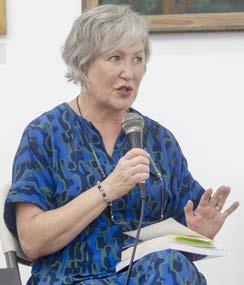
recognition is more a human condition than anything else It's not necessarily just social media. It's also about emotional parasites. It's about women finding their voice,” she added. LEECH will hit the shelves of Guyanese bookstores and Amazon on September 20 .
Telling the Stories of the Caribbean: Celeste Mohammed’s Ever Since We Small
Trinidadian lawyer-turned-prolific writer Celeste Mohammed is one of the voices behind Caribbean stories on the international stage. She holds an MFA in Creative Writing from Lesley University, Cambridge, Massachusetts. Mohammed is the author of the novel-in-stories Pleasantview, which won the 2022 OCM Bocas Prize for Caribbean Literature, the 2022 CLMP Firecracker Award for Fiction, and was a finalist for the UK Society of Authors’ McKitterick Prize for Fiction. Her short fiction has received numerous accolades, including the PEN/ Robert J. Dau Short Story Prize, the Virginia Woolf Award for Short Fiction, and
the John D. Gardner Memorial Prize. In 2024, she was shortlisted for the Commonwealth Short Story Prize.
Her most recent book, however, titled Ever Since We Small, tells the story of an Indian family living in a predominantly non-Indian community that is undergoing change.
Published by Jack Miranda Books UK, Ever Since We Small is a family saga that takes its readers from the days of the British Raj in India to multicultural modern Trinidad. The book, like Mohammed herself, is unapologetically Caribbean, ushering in cultural elements and language. Written in a blend of Standard English and several flavours of Trinidadian Creole, the book follows the bloodline of a young woman, Jayanti, after her decision to become a girmitiya, an indentured labourer in the Caribbean.
Highlighting that the book is very personal to her, Mohammed shared, “You don't often see Indo-Caribbean dialect or Creole written. This book attempts to do that, to put that down in writing so Turn to page XVIII
WRITERS often say that the best story you can tell is that of your very own, and the Guyana Prize for Literature continues to highlight and pay homage to Guyanese writers telling Guyanese stories. Berkley Wendell Semple is one of the numerous writers awarded in this year’s Guyana Prize, with his book Kipling Plass winning third place in the fiction category.
Described as a politically astute coming-of-age novel, Semple’s book is set in Guyana in the turbulent late 1970s, where Kipling ‘Kip’ Plass narrates his and his teenage friends’ struggles for both physical and emotional survival as they contend with the colonial past, racial animosity, and Guyana’s economic hardships.
A passionate writer, poet, and advocate for the appreciation of Guyanese literature and the people behind it, Semple says he is committed to continuing to tell the historic stories of Guyana and is urging Guyanese everywhere to read and appreciate the tales that come out of their country.
At the forefront of Semple’s work is his identity as a Guyanese; a sense of identity firmly rooted despite spending most of his life away from the country of his birth. Born in Linden and raised in Mahaica, with family ties in communities like Calcutta in Berbice, Semple is no stranger to life in Guyana’s countryside.
Though born in Wismar, Semple’s childhood memories are tied more closely to the countryside than the mining town, an upbringing he believes had a positive impact on who he is as a writer. “My grandparents were farmers; rice farmers
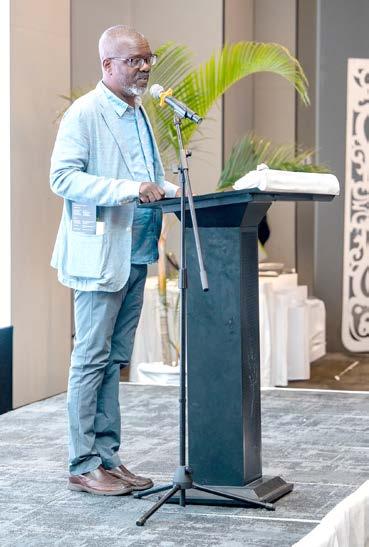
and cattle farmers. I’m a country kind of guy. I grew up around the sea, around milking cows with my grandfather, especially my maternal grandfather. It was a kind of ideal life. It certainly made
me a better writer,” he said. His writing, Semple explains, is shaped by those early scenes, by listening to his family, watching their habits, and absorbing the stories told in small homes and farm fields. “I was always outside, observing nature, listening to people, what they said and how they said it. Generations of my family lived closely together. What I write about are their stories
and what has been passed down,” he shared.
Semple’s upbringing has inspired a very exciting literary career. He has published four collections of poetry: Lamplight Teller, awarded a 2004 Guyana Prize for Poetry; The Solo Flyer; The Central Station; and Flight and Other Poems, awarded the 2023 Guyana Prize for Literature. He has also edited a book of student poems. His poetry and fiction have appeared in Callaloo, The Hampden-Sydney Review, The Caribbean Writer (for which he was awarded a Daily News Prize for poetry), and many other publications.
Semple left Guyana while still quite young, in 1983, just shy of his fifteenth birthday. Although a deeply shocking experience, Semple was determined to not just hold on to his Guyanese roots but also tell Guyanese stories. “At 14, it was a shock. Everything had to be relearned. I used to have these awful dreams, nightmares, that I was back home with my grandfather in Guyana. I’d wake up and still be in the US. It took me a long time to adjust.” The cultural disconnect was even more visible at school, as he added. “Nothing made me feel more like a foreigner than going to school in the US. I went to high school there, and it’s an experience I wouldn’t want to repeat.”
Semple adapted, however, even serving several years in the US military. Still, he never let go of his Guyanese self and identity. “By then, I knew how to switch my Guyanese-ness on and off; how to navigate between my American and Guyanese selves.” For Semple, this flexibility was necessary, but never came at the cost
of losing himself and all the unique character traits and ideas that make Guyanese who they are.
“Guyanese people are more practical and direct. In the US, there’s a lot more coded speech. I had to hold on to certain Guyanese traits because I didn’t want to change completely. There’s value in maintaining that identity; it’s a kind of discipline.”
That discipline extended into his writing. Semple sees no need to centre American life in his work, but is a passionate advocate for the vibrant stories present in Guyana, now and throughout history, that need to be told. All of Semple’s work focuses on the Guyanese experience in one way or another.
“I’m proud of all my work, proud of how I’ve treated Guyanese subject matter and identity. There’s nothing in me that wants to describe America. Frankly, I don’t think America needs another writer to describe it.” Instead, he finds deep value in writing about Guyana, its past, its people, its transformations. “It’s worthwhile to write about Guyana the way Roy Heath or Wilson Harris did. Guyana is a worthy subject for any kind of literary endeavour. I’m pretty keen on that,” he added.
He is currently working on the second novel in what he envisions as a trilogy, each book set in a different period of Guyana’s history.
“I’m working on a novel now, it’s the middle of a planned trilogy, each book set in a different time period in Guyana. This one is set between the mid-1970s and 1985, and it reflects the politics of the time.” Semple said this period was particularly Turn to page X
GUYANA’S fashion and designing landscape is growing, with numerous new events having taken off in the last year, and a whole host of others slated for this year. However, some local, young designers are making the call for something that is imperative to the success of any field - collaboration.
Designer, entrepreneur, and mother, El-faatyma Alexander, is a talented seamstress and designer whose work has gained attention at local markets and events, but the goal, she says, is to have her pieces featured on a runway. Like so many other young creatives, El-faatyma is making the call for more collaboration, not just among established designers, but with newcomers too.
Born in the community of Kwakwani, El-faatyma, moved to Berbice during her childhood, and now lives on the East Bank of Georgetown. Creativity, however, has followed her throughout each chapter. “I design clothes, do alterations, sew, crochet, and make accessories,” she explained. “That’s the heart of El-faatyma’s Unique Creations.”
Her journey started in childhood, crafting clothes not for people at first, but for dolls. “I started making clothes when I was a kid. I’d sew little outfits for my dolls. When I got old-
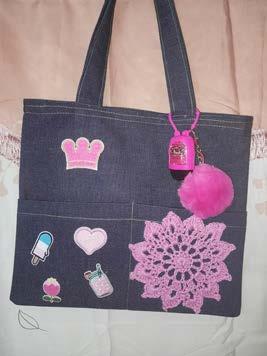

Designer, entrepreneur, and mother, El-faatyma Alexander in a design of her very own
er, I just kept doing it,’ she shared. The foundation for her creativity came from family.
“My grandmother inspired me. She used to sew and knit too,” she said. “She showed me the basics, like how to make a chain in crochet, and I developed from there.”
At 18, El-faatyma decided to take things more seriously. A local seamstress who used

El-faatyma Alexander pictured in one of her own crotched creations
to sew her school uniforms became her mentor. “I asked her to teach me, and she agreed. That’s how it all began.” Now 28, her journey has been anything but linear. After getting married at 21 and becoming a m other, she had to pause her creative work. “I stopped for a while after I had my daughter,” she said.
“Then I started back, stopped again when I had my son at 25, and started again. It’s been on and off, but I’ve been back at it consistently for the past four years.”
Balancing motherhood and business has not always been easy, but El-faatyma credits her strong support system. “My kids’ father helps a lot, he’s very hands-on. It’s
real teamwork,” she said. Still, challenges persist, especially in expanding her design knowledge. “One challenge was not knowing how to make certain styles. That’s why I went to Carnegie School of Home Economics last year. I already knew a lot, but I wanted to learn more, and I did.” This is why she says collaboration is needed.
Her time at Carnegie gave her the boost she needed. “I learned how to install pockets and refine my garment construction. It gave me a big boost.”
Today, she mostly focuses on alterations, though her heart is in original design. “Even though I have more knowledge, I usually design my own clothes and put them on display instead of making custom orders.”
El-faatyma’s crocheted pieces gain the most traction, with many people being captivated by the creativity and hard work
Turn to page VIII
Co-founder of the Rupununi Music and Arts Festival, Dr. Bob Ramdhanie and Collin Edwards (Janio Edwards photo)
GUYANA, like much of the Caribbean, boasts a vibrant calendar of festivals, from carnival celebrations to heritage days, but hidden in the heart of Region Nine is an event that is doing things a bit differently. The Rupununi Music and Arts Festival, now in its 11th year, is a cultural celebration rooted not just in performance, but in purpose.
With a mission to preserve indigenous culture, promote environmental sustainability, and foster community tourism, this one-ofa-kind festival is set to make its live return this October after a five-year hiatus.
First launched at the Rock View Lodge in Annai, the festival’s beginnings were humble but is backed by a passion team with bold ideas. Its co-founder, Dr. Bob Ramdhanie, recalls how a conversation with a musician sparked what would
become one of Guyana’s most immersive cultural experiences. “I was living in London at the time and managing a Guyanese musician named Keith. He mentioned he came from Rock View in Region Nine and said it would be a lovely place for a festival.” Ramdhanie added that, “I was invited to visit Rock View, which I did, and in reality, that was the birth of the festival.”
With the help of Colin Edwards, owner of Rock View Lodge, the first two festivals were held there. In 2016, the team grew into an advisory group of volunteers, including Guyanese musician, Gavin Mendonca, and together they transformed the festival from a local showcase into a full-scale experience that merges arts, education, and eco-awareness. “The festival has always been about nurturing, developing, and supporting Guyanese traditional culture,
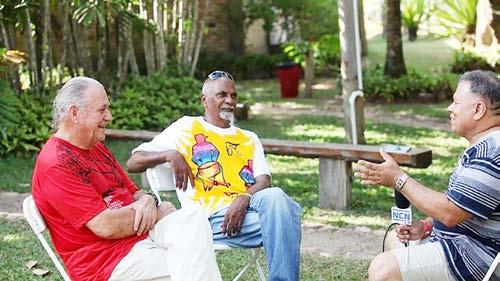
especially in Region Nine,” Ramdhanie explained. “We support the continuation and evolution of Amerindian culture,” he added. That evolution has taken shape in many ways. One of the most impactful is the “Arts and the Environment” programme, which pairs creativity with conservation.
Through this initiative, discarded items are upcycled into musical instruments, and tree-planting activities are integrated into festival programming. “We’re planting trees of three specific types: for food like breadfruit, cashew, coconuts; for medicine, vines, roots, bark; and for protection and beauty,
shade and flowering trees,” said Ramdhanie. Collaborating with the University of Guyana’s botany department and the wisdom of local Amerindian communities, the festival is now laying the groundwork for a permanent cultural and environmental base in the region.
But make no mistake, the
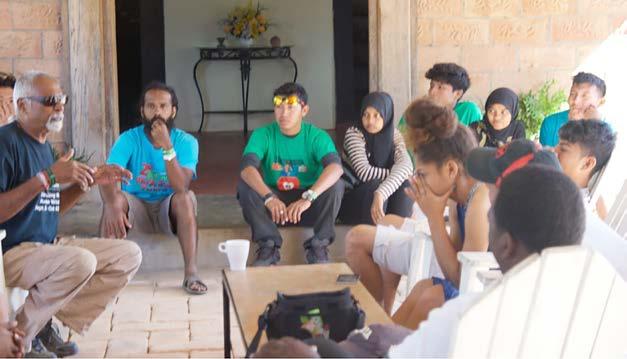
Co-Founder & Festival Director, Dr. Bob Ramdhanie (far left) with volunteers
Rupununi Music and Arts Festival is not your typical cultural event. It’s an experience. Over three days, festivalgoers are treated to more than just performances. Days are spent exploring the pristine beauty of Region Nine, while evenings and nights offer workshops, music, and dancing under the stars.
“You literally get two for the price of one: nature and the arts,” Ramdhanie said.
“During the day, visitors can explore the region, take trips to Moco Moco Falls, visit nearby villages, go fishing; and in the afternoon and evening, we host arts and culture workshops and performances.”
Creative Director Gavin Mendonca echoed this unique blend of culture and adventure. “The Rupununi Music & Arts Festival is the most unique festival experience available in Guyana, combining arts, craft and music from around the world with a weekend of camping and community.”
Mendonca added that, “During the day, festival-goers can tap into the rich offerings of the Rupununi with tours to Kumu Falls, Moco Moco Falls, or a drive through the savannah to spot anteaters, birds, and giant termite mounds!” Workshops are a key Turn to page XXV

MOST of the things we learn are gained for better or for worse, not from direct instructions from our parents or relatives, but instead from the world around us. All that we absorb will not serve us positively.
But that will depend on the logic and the references that those close to us elaborate on, in relation to the real world we will have to engage — and which will engage us — that we become exemplary of when situations arise.
I did not grow up with my father, but we spent time together.
He would always insist, for instance, that possibly some chap with a Moses beard fits an accepted costume that people have become accustomed to as a source of knowledge, honesty and proposing to be above query.
But that’s how society is — he who is dressed to convince.
Old people with their proverbs always insist that not all that glitters is gold. We have always had conmen and women, who, back then, used Hollywood stage costumes and hairdos up
to the ’70s to sell houses, investment ideas, and misplaced trust. Many of them were certified enough to convince.
What knowledge does is create trust that is genuine, helpful, or deceptive. The latter wears a mask of courtship, capturing your confidence and exploiting your immediate passion.
That’s why you need to know. Listen carefully. If you have something to sell, explore its market price. Try to understand its advantages or disadvantages. This can also relate to the gang you move with. Learn from oth-
er people’s experiences. That brings us to two dispositions: one of keen distrust, accompanied by a smile and a promise of co-operation, albeit with no paperwork completed. Putting your signature on a piece of paper is not wise unless it is properly explored and understood.
No harm in double-checking. It’s all part of checking things out. However, first, get to know the legal world.
That can protect or distort what you’re interested in and damage your peace of mind.
Remember, without bad intentions, some may interpret things based on feelings, and feelings can be dangerous and misguiding.
Remember that we all have friends or acquaintances whose siblings and close friends have been swindled.
Your parents have sibling stories to tell, too, but in many instances, they restrain themselves, which, in many cases, can be explained as not starting a fire.
However, they warn against doing business with an uncle, cousin, or aunt, this or that — which, if eventually translated,
speaks to the trust factor in our current world: the legal paperwork, rather than oral trust; retreating to the ancient covenant sealed in ink, and today’s laws and legal rules.
The other parent is essentially the man in the street — some aware of, but not knowing; others remembering pieces of conversations overheard. The other parent can only affect you if you’re too lazy to check things out.
It might not be done with wild malice, but with the sober relating of what is not the truth, so far.
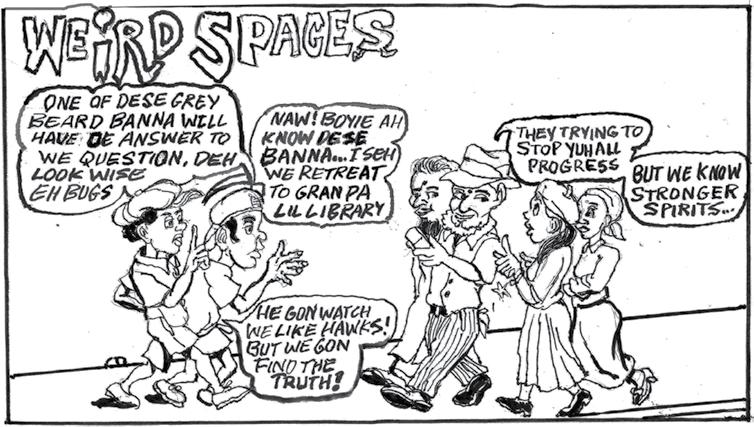



From page IV required to make the pieces. However, creating crochet pieces is a labour of love.
“A full crochet dress could take about a week, or longer if it’s a tighter stitch. If it’s a looser pattern, it takes less time. But it depends, I’m also a mom, so I can’t always focus on pieces at home,” she shared.
Her crochet designs, ranging from dresses to accessories, are mostly one-ofa-kind. “People support the sewing and alteration part of the business a lot; those are everyday needs,” she said.
“Crochet orders come more around special occasions, vacations, or events like the UncappeD Market,” El-faatyma added. She also experiments with mixed materials. “I design bags using denim and add crochet patches and patterns to them, those are my own concepts too.”
Despite her talent, El-faatyma is still waiting for her big fashion moment. “I haven’t done any fashion shows, only the WE Lift Exhibition hosted by the Ministry of Human Services,” she added, “I don’t know how to get into fashion shows. That’s a big challenge.”
Highlighting a major hurdle that many young designers advocate around,
El-faatyma stated that information about fashion events and opportunities is hard to find. “Fashion events aren’t advertised the way programmes like UncappeD or the WE Lift Exhibition are,” she explained. “If there were public fashion showcases with open entry, more designers like me could participate.”
She believes this is where collaboration and inclusivity could make all the difference. “We need a public fashion platform in Guyana,” she emphasised, “Something like the UncappeD Market, but for fashion design. That way it’s fair and open,” she added. The call, she said, is not just for herself, but for the broader creative community. “We need more collaboration among designers in Guyana. It would really help the fashion landscape grow.” Most of El-faatyma’s designs are posted on her Facebook page, though she’s also active on WhatsApp, Instagram, and TikTok.
From childhood creations to unique crochet and custom designs, El-faatyma Alexander continues to build her brand, stitch by stitch, while calling for a more united and visible fashion community in Guyana.


THE little girl ran around the garden, playing whilst her mother and brothers cleaned the weeds from the plant beds and watered the vegetable plants. She loved the colourful butterflies flying around, alighting on the plants, laughing and tumbling over sometimes as she tried to catch them.
Her mother called out to her to be careful, and as the afternoon grew late, the butterflies left. She then picked up a small basket of tomatoes that she had helped to pick.
Their garden was a piece of land across the road from the house, alongside which was a trench. That was a long stretch of land owned by the sugar estate, and homeowners were allowed to plant in the area in front of them. Not everyone did, but it was something good to sustain a family’s needs with fresh, organic fruits and vegetables.
It was a country life, pure and simple, with peace, quiet, and friendly neighbours. School was within walking distance, and along the way, the little girl, Marissa, often stopped to pick wildflowers on the wayside to give to her teacher. She was loved for her petite nature, her cheerful smile, and her long hair in plaits.
She had a passion for reading, and as she advanced into higher classes, history became quite a fascination for her, and she felt intrigued by the stories of her ancestors’ journey across the Kala Pani and plantation life.
“It’s like leaving one world and coming into another,” she mused.
She learnt a lot from listening to families and neighbours talking on various topics in politics and the economy. At that young age, though, she couldn’t comprehend what it all meant, but as she grew older, she understood the adults’ uncertainty, worry and fear of a change imposed on their lives. As a child, she couldn’t
see the changes or feel their impact, and she was studying for her Common Entrance examinations when her father announced they would be leaving to live in North America.
Marissa didn’t take that too well, unhappy about leaving the place and home she loved so much. She would miss her friends, her teacher, and most of all, she would miss the garden and the beautiful butterflies.
She had cried that early morning when they were bundled, still sleepy, into the bus — her young heart breaking as they began their journey to a new place, a new life.
The small apartment was so different from the warmth and cheerfulness of home — birds chirping as the sun rose in the morning, soft devotional songs on the radio, the aroma of breakfast in the air, and the friendly voices of the neighbours.
“I want to go back home,” she often told her mother and father.
But they were adamant they had to stay, to start a new life in this new country.
“One day, you will understand the reason,” her father had told her.
She went to school with her brothers on a bus, and when they came back home, their mother was not there, as she usually was. She had gone to work. There was no hot, fresh food on the table, and Marissa started crying again.
She didn’t see her father for two days because he was working double shifts.
“What a wonderful life!” she had sighed with sarcasm.
As time went on, she saw people she knew from her street and community back home, living in apartments and basements in the neighbourhood where she lived, and she had wondered, “Why is everyone leaving?”
It had made her feel sad, for their ancestors had
worked hard with unbroken resolve, putting their shoulders to the grind and leaving a legacy that was an inheritance for the generations to follow.
“That flame has to be kept burning,” she intoned.
Many of those who migrated, however, did not want to return, elated that they had left a poor country for a wealthy one, never mind the long working hours and scant free time.
It was, for them, a paradise, and the country back home had become, in their minds, unworthy.
Marissa shook her head in mock annoyance, trying not to show how upset she was, and murmured, “One day… one day.”
She wasn’t sure why she voiced those words — maybe she felt that deep within her, things in her country would
be good and life would be better.
Her family took her to many different places whenever they could afford the time — the enchanting Disneyland, exciting water parks, the zoo, and the museum, which fascinated her young mind. The friends she made from her country and other countries were so awed by life in their new country that they expressed they would never leave.
The one thing, though, in Marissa’s mind was that, “It’s not home.”
High school was a significant step up in her studies, and one day in class, while reading about American history, she said to herself, “I should be studying Caribbean history.”
And that day, she made a promise to herself to study hard to earn a degree in law
so she could return home to serve the people of her country.
Ten years later, she made good on that promise and returned home. She got admitted to the Bar and began her work as a young lawyer.
“Finally,” she expressed, joy in her heart, “I’m home. We can’t all leave — the motherland needs her children.”
Her father had returned with her to help her resettle, and it saddened her heart to see the changes in the street where she had lived.
Most people had migrated, and a few of the old ones had passed away. Houses were closed, rented or sold to strangers. The neighbourliness, the engaging conversation, and laughter were no longer there, and bushes had taken over the gardens across the road.
“This is awful,” she exclaimed, “Where did it all go?”
Her father refurbished their house for her comfort and convenience and hired a daily gardener to resuscitate the garden.
As the days and months passed, Marissa studied the country’s politics, economy, resources, trade, people, and society as a whole. That knowledge was important to her for the various cases she would be retained for as counsel.
People began to hear about the young attorney, her brilliance, and the high success rate of her cases, which she won for low-income individuals and abused women.
Soon, many were reaching out to her, and often she was told, “You have quite a Turn to page XII
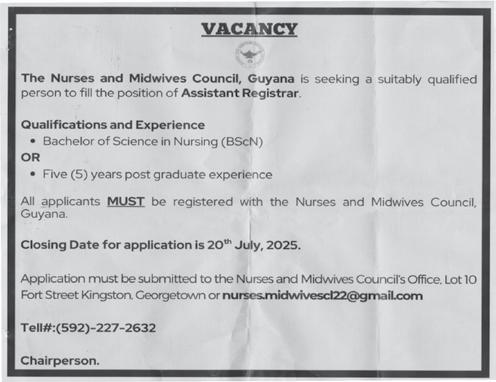

From page III
fascinating to him because of the political awareness that was growing across the country. “I was inspired by how people became politically aware. I was very interested in that period, especially around Walter Rodney.”
While Kipling Plass took him seven years to write, this second novel is moving along much faster. “I’ve developed some skill now. Maybe this one will take three years.
I’m practically done.”
Alongside the novel, Semple is preparing for the release of his poetry collection Imperial Reach. “It explores how colonial legacies still influence our contemporary lives, how we’ve imbibed some of the old colonial manners.” He says the manuscript is already with his publisher, Peepal Tree Press in the UK, and currently in the editing phase.
Reflecting on his participation in this year’s Guyana Literary Festival, Semple shared that it felt more expansive than previous years. “This year’s Literary Festival felt different, it was more elaborate, and I got to meet many more writers from outside Guyana who are important names in Caribbean literature.”
He also appreciated the focus on mentorship and learning. “I attended all the workshops. There was much more depth to the festival this year. I met some of the young writers too, which I really enjoyed.” He added, “I always offer advice to young writers. Some follow up, and I make the time to
mentor them. I think there should be a mentorship component built into the Guyana Prize.”
Shifting focus to the Guyana Prize for Literature, Semple believes the Prize can grow, especially in terms of visibility. Reflecting on his experience, he stated that while this year’s prize saw some phenomenal submissions, moving forward he would like to see more works submitted. “I expected more submissions for the Guyana Prize.
The more submissions, the better the evaluation process. The organisers need to publicise the prize more and for longer.”
Despite winning third place with Kipling Plass, he said he didn’t expect it. “I’ve submitted to the Guyana Prize before. My second, third, and fourth books made the shortlist but didn’t win. So I didn’t know Kipling Plass would win. You can’t really tell.”
Semple, an educational administrator and librarian by profession, is also a PhD candidate at Long Island University. But at his core, he’s still the boy from Mahaica, gathering stories from the past and reshaping them into something new, something lasting. “All my books have been about Guyana. That’s what I do, it’s my sole subject, you might say.” In a literary world so often dominated by voices outside of the region, Berkley Wendell Semple remains grounded in his roots, choosing again and again to tell Guyanese stories, for readers today and for generations to come.




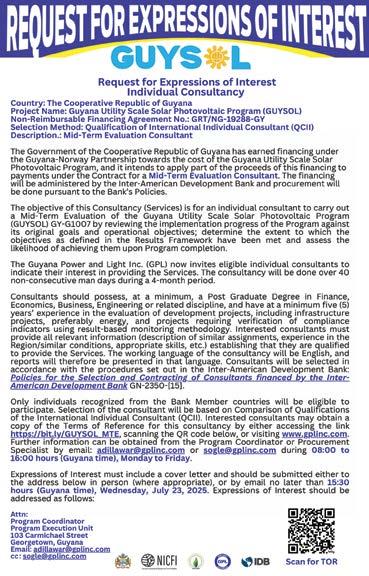
From page IX refreshing personality, you’re God-sent, you’re a blessing.”
She always smiled warmly and said “thanks”, for helping people gave her a deep sense of satisfaction.
The rest of her family came regularly to visit, and as things improved in the country, more people from her street returned for regular visits — with a few deciding to remigrate — and that filled Marissa’s heart with such joy. It felt like the street and community were being reborn, and she exulted, “There is no place in the world better than home.”
And in the afternoons, when she could be home early, she went into the garden to pick vegetables and watch the butterflies flying around.
From a little girl, it was what she loved, and she knew in her heart it would be for her forever.







IN Sociology, the family is the most important social unit of society. It is the core unit that is responsible for our socialisation and necessities. In Guyana, the family is seen as sacred. It is often emphasised that family is the root of our culture.
From being our literal brother’s keepers to honouring our parents, the family is meant to be our most important support system in challenging times.
Unfortunately for many, this ideology is not the case. For many in Guyana, the family is less of a core unit for providing support and needs, and more of a source of trauma and pain.
There is a common belief among Guyanese that what happens in the home should remain private. I believe that ideology should not be taken into consideration when basic human rights are being violated daily in a household. From verbal or physical abuse, neglect, blackmail, coercion, harassment, humiliation, to manipulation — people are being violated daily inside their own homes at the hands of their own “blood”.
Unfortunately, their trauma does not stem from other people, oppressive systems or indirect encounters — it comes from the ones they call family or the ones they love most.
Where there are abuse dynamics between children and parents, this is often seen as “normal” in most Guyanese households.
Unfortunately, our culture
“protects” parents by associating disobedience as one of the “deadly sins” while also associating violence as “discipline”. Unfortunately, children cannot speak up in certain households, and if they do, they face consequences. Now, don’t get me wrong, children should be taught right from wrong — but we can do so without a “tamarind whip” involved.
Emotional safety, free from trauma or abuse, is a basic human right, not a privilege or gift. It needs to be respected and recognised, even in children. This mindset in households will only lead to these children becoming adults who are socially awkward, isolated and fearful of speaking up for their rights.
The emotional or physical distress in households can ultimately lead to longterm mental health challenges such as low self-esteem, chronic anxiety and depression. Many children in Guyana today suffer in silence for fear of being “disobedient”, and ultimately, these children become adults who are traumatised.
This, in return, can affect their adult relationships, with many not being able to recognise what a healthy, safe relationship or environment is. As such, it only continues the cycle of abuse as they get older, only in different forms.
If you’re a young Guyanese faced with such a crisis, I urge you to protect your peace. You can start by taking control of a specific space, such as your bedroom, or finding healthy coping

mechanisms, like journaling, to channel your energy or thoughts into.
I also suggest you start therapy with a professional, because sometimes, there is so much deep-rooted trauma that we may not be aware of, even though it affects our daily lives without us knowing.
These violations might be
seen as “normal” or a recipe of “success” for previous generations, but if you feel violated, harmed or traumatised, it is completely wrong. It is time we start recognising these harmful practices in our culture and stop making excuses; instead, we should collectively work on solutions to eradicate such a mindset. We need to start opening up more
safe spaces for young people to visit to share their hurt and stories — from schools, churches and social groups.
All Guyanese are protected by the Family Violence Act of 2024. If you or someone you know is being abused in any form, I urge you to report it to the nearest police station.
The abuse that your
family generates is still abuse at the end of the day.
“Family” is not always a safe space for people to be in or a part of, and the minute we recognise that it can also be a space for the most traumatising, deep and open-ended emotional wounds — that’s the minute we start moving forward as Guyanese.


WHAT do you see when you look in the mirror?
Perhaps you may notice your familiar features – the texture of your hair, the shape of your nose or the colour of your skin. You may see a friend whom you have grown to recognise, or a stranger whose flaws are glaringly evident every time you see them.
However, if you look
OVER the course of our lives, all human beings unfurl and bloom like the creased pages of a diary that is slowly being filled with fresh stories. We allow life to embrace us, and, in return, we are granted the space to be who we are. As we grow up, the gentle discomfort and pressures of creating your identity fade. Our skin becomes our armour, and our heart fills with the satisfaction of being able to live our lives just as we had imagined in our
closely enough, you will notice something rather interesting. You will notice that you are actually an ancestral puzzle! Our appearance, our traits and our very identity are often a unique amalgamation of pieces of our predecessors that have been passed down through the generations like heirlooms. Our features are the stories of our ancestors, composed by
childhood dreams. Even those who may not yet have attained their goals are comforted by the freedom of choice—the grace of knowing that, even though they have not reached their destination, they still have the power to steer themselves towards it. The reward for those who are true to themselves is the ability to look into a mirror and respect the person they see. They shall experience no loss or failure that can take away this ability from
them.
time and spontaneity. We are both extraordinarily unique and very similar to our family members from the past.
Our hair may be a memory of a grandmother who wore it in the same manner that we do. Our smile may resemble that of a great-grandfather. Our hands may have the same shape as a greataunt who was a painter or a musician. Our very dreams,
Recently, I discovered the story of Narcissus from Greek mythology. Narcissus was a young man who was prophesied by a prophet to live a long and fruitful life as long as he did “not know himself.” He was known to be extremely handsome but prone to rejecting the affections of others, no matter how sincere they were. Then, one day, as he was travelling through a forest, he came across a body of water and caught his reflection glimmering
our ideas, and values may be something we have inherited from predecessors who fought to ensure that future generations would be able to see them realised.
The term “like begets like” is a phrase often used in discussions related to genetics and heredity. The phrase refers to the fact that the offspring of an organism is always similar, if not identi-
on its surface. He leaned forward and watched as his own perfect face peered back into his eyes. Then, he remained there, falling in love with his own reflection until he passed away from thirst and starvation, unable to tear his eyes away from it. The spot where he died was marked by a bright yellow flower known as the Narcissus. We now commonly refer to the Narcissus flower as the daffodil.
cal, to the parent organism. Regardless of whether it is a bacterial cell or a human being that creates an offspring, all creatures pass on characteristics through their genes that strongly link their descendants back to themselves and their own predecessors. This principle not only describes a mark of identity, but it is also the key to how populations learn to survive and thrive.
The myth of Narcissus is a fascinating tale


that offers us a valuable lesson. It teaches us the dangers of self-absorption and the losses we may face by refusing to open ourselves up to the love and affection of others. We may speculate that perhaps if Narcissus had already been in love with another person, he might never have been inclined to fall so madly in love with himself. It also shows us that our destiny is rarely within ourselves. We may spend a lifetime preparing ourselves to be better people, but this preparation will not mean anything if we do not use it to change the world for the better. Beauty and good character have no power if their positive influence does not extend beyond our own boundaries.
Thus, it is no secret that we resemble our ancestors. Nevertheless, we do not immediately think of our origins every time we glance at a mirror. It is easy for us to dissociate ourselves from our past. It is easy to see ourselves as an isolated mixture of random features that may or may not be linked to other people.
As such, it is easy to stop loving this random mixture of features. Regardless of the beauty often woven into the intricate patterns of our faces, if we fail to see the connection behind these features or the person they represent, we lose our connection with ourselves and our subsequent ability to love who we are.
Self-love is a major step that precedes self-actualisation. Most young people struggle with their physical appearance as they learn to understand their own identity and begin to develop a gentle self-love.
This struggle is not only a superficial one initiated by
The process of building an identity—of “knowing ourselves”—is necessary as we progress through our lives. Attempting to live without being comfortable with who we are is much like living in a space where we cannot fully walk, stretch, or look upwards at the sky. However, it is also quite easy to fall into the lonely path of knowing no one but ourselves. As we lean forward to watch our shimmering reflection grow and transform into something that we are
the pressure of mass media and peer comparison, but it also runs deep into how we perceive ourselves. It changes the very way we relate to the world around us. The first step to self-love is beginning to realise and accept just how deeply our identities are connected to the past. We are already born whole – apart from growth, there is no other change that needs to be made to make us more complete than we already are.
proud of, it is quite easy to forget to look around us at the people who are fuelling the successes and the joys we are experiencing.
The affections of others are a gentle influence. These affections can fade away and disappear long before we glance around and begin to notice that we stand completely alone. Yet, the emptiness they leave behind when they are gone is a mighty force. Those who have developed a strong sense of identity and learned to love themselves deeply will not be limited by the failures they experience or the losses they face. However, they are still quite open to the possibility of grief.
Therefore, we must learn to love ourselves, simply because we have the extraordinary chance to be whoever we want to be in this world. Let us learn to love ourselves not because we resemble a celebrity or someone we admire, but because there are small pieces within us that have been left by people who are deeply connected to us in many ways. We must love ourselves because it is the only way for us to love the people that we will never have a chance to meet.
In a similar manner, it is possible for our own influences and connections to the world to fade away, just like the affections of others. When we fail to acknowledge and reciprocate the love that others proffer us, we will eventually lose it. If we stop reaching out to the world with kindness, we will ultimately lose our ability to impact it.
The world is in constant need of people who are willing to share their love. Perhaps the deepest and kindest forms of love begin with how we see the person who greets us in the mirror when we look into it.
After all, if like begets like, then the love we place into ourselves will surely find itself being reproduced in our actions on the world around us.
Each of us holds a massive power within us. Let us allow this power to extend beyond us so it can reach parts of the world that truly need it.


EMPLOYEES are motivated in various ways. It may be surprising to see that something one employee rejects can motivate another. Some employees find pleasure in doing certain tasks that others may dislike.
Anyone who has a leadership role must understand that the same approach cannot please all their employees. It is therefore essential to study the employees you are required to work or interact with on a daily basis to ascertain how best you can meet everyone’s needs while minimising any adverse effects.
When employees are motivated, they can do wonders! A motivated workforce can enable an organisation to achieve its targets. A motivated school-age child may perform excellently in all their examinations. A motivated employee may go beyond the normal call of duty to ensure that the organisation achieves its goals.
It is challenging for leaders to understand their employees’ needs consistently. A very effective way to learn about someone’s needs is to ask them. Some employees are just waiting for you to ask so that they may tell you what motivates them.
On many occasions, some employees may stand on the sidelines and assume they know an individual’s needs. While that approach may be correct at times, it will be wrong at others.
Effective Communication with Employees
With effective communication, there is an opportunity for feedback. Through that approach, a final decision may be made or a better understanding achieved. For example, suppose an employee is motivated by overtime work, but the organisation’s management explains to them that the organisation cannot afford to
offer overtime for one reason or another.
Some of the conflicts an organisation experiences could be resolved through effective communication. Employees’ motives may also be better understood in this way. Some managers want employees to approach them and express everything that motivates them, but that may not be realistic. The manager should instead create an atmosphere that allows for effective communication, enabling employees' needs to be identified.
There are times when employees can negotiate their compensation with the employer independently. However, there are other situations and organisations where a third party will be needed to assist in negotiating employees’ compensation. On many occasions, trade union representatives are skilled and mentally prepared to discuss a wide range of matters with management to ensure each employee receives an increase in compensation. They also negotiate for other entitlements beyond salaries.
There are times when trade union representatives must fight long and fierce battles with the organisation in order for employees to be provided with basic necessities (e.g., safety gear, an appropriate lunch hour, etc.). Not all negotiated items are about money.
Trade unionists must ensure that they protect workers and work towards their well-being. They must also strive to establish a healthy and open relationship with the organisation, so that less time is spent debating and more time is spent on productive meetings. It is also expected that management will work with the union to ensure that employees are
treated well and receive fair pay for their work.
Some employers take pride in adequately compensating their employees. When this is done, employees often work diligently for their employers, and there is likely to be less tension between the two parties.
Some employees will even boast to friends, family and others about how well their employer treats them. Because organisations compete in the labour market, they should consider employees not just as a cost but as a resource in which the organisation has invested and from
which it expects valuable returns (Noe et al., 2015).
When this happens, employees may remain with such an employer for many years — sometimes even until retirement — due to the good treatment they receive. Employers must remember that, with globalisation, employees can leave one organisation and seek work elsewhere. Therefore, the employer must explore how to compensate employees adequately and retain them for the long term.
Whenever an experienced and knowledgeable employee leaves an organisation, that
organisation may suffer a decline in performance — especially if no one was understudying that employee or if their responsibilities were not properly documented.
Many long-serving employees have institutional knowledge that no software can adequately capture. Organisations should therefore put systems in place to retain employees who are having a positive impact and who demonstrate the right attitude toward work.
Employers must avoid situations where high-quality employees leave simply because the organisation re-
fused to pay a small raise they could afford. When experienced employees leave, replacements may be found — but not always of the same quality.
All employees must be treated with importance and respect Employees possess institutional memory that can help an organisation make a significant impact on the world. Compensation is always an important decision for management.
Many employers are seeking workers with the very skills your organisation needs. If they offer just a few
Turn to page XXV

From page II people can experience it. Because it’s a dying language. The people who actually speak like that are less and less and less. So there are many ways in which this book is special for me.”
Ever Since We Small also aims to highlight major social issues present in Trinidadian and Caribbean culture, with violence against women at the forefront. Although a difficult topic to tackle, Mohammed shares that this book is her way of not just highlighting but telling the real, raw stories that need to be told: “In Trinidad we have a long history of intimate partner violence. And I think it was around 2001 we had this outpouring of people into the streets protesting against what was happening. And I
looked at all the protests and people holding vigils and lighting candles. And in my own way I said, you know what, my vigil, my candle, will be written in print. Because a candle is a thing you light, now it’s out. But if I write this book exploring this history, then it’s forever there. It’s a candle that will not go out.”
Remembering Great Storytellers: Alison Donnell’s Lost and Found British literary scholar and professor Alison Donnell is known for her pioneering work in Caribbean, postcolonial, and Black British literature. Currently a professor of English at the University of East Anglia, Donnell has spent over two decades researching the literary voices
of marginalised and vulnerable groups, with a focus on gender, sexuality, and diaspora. She co-edited The Routledge Reader in Caribbean Literature and has published extensively on writers such as Una Marson and Olive Senior. Her most recent book, however, Lost and Found: An A–Z of Neglected Writers of the Anglophone Caribbean, is a fascinating compilation of some of the Caribbean’s best — but forgotten—writers. Speaking to Pepperpot Magazine at the recently concluded literary festival, Donnell shared that there are numerous Guyanese writers and authors who, although prolific in their craft, may have had their work lost or forgotten. But Lost and Found aims to reintroduce these storytellers, whose

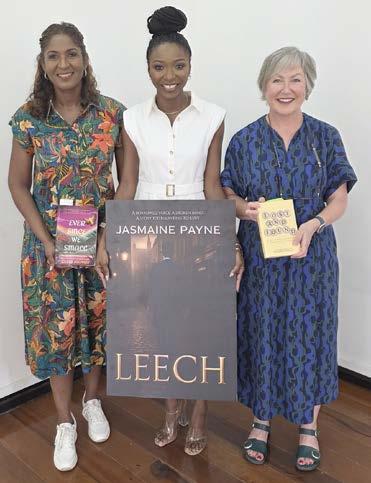
work, Donnell says, is just as relevant and captivating today as it was decades ago.
“There are very many writers of significance in Guyana who people might not be aware of. And that there’s a very long literary tradition. And it’s important to know that, to have a sense of those literary ancestors as well, I think. And maybe, you know, a lot of those writers wrote for children, so it would be nice if their works could find their way back into schools. That would be very special.”
Lost and Found not only seeks to remind the Caribbean about the works of these writers, but also about their lives and how they shaped their work. One of the important points the book highlights is that, for many
Caribbean writers, their stories focused on their origins — with Guyanese being no exception.
“All of these writers, firmly their writing, are very Guyanese. So, you know, writers who were addressing the landscape, the cultural multiplicity, the languages, everything about this society. They wrote so that people could read this society and this place.”
She further added, “And so it would be lovely if they could be read again here.”
The 2024 Guyana Literary Festival was a revival, a platform, and a promise. It was reminder that the Caribbean continues to produce stories worth telling, voices worth hearing, and histories worth remembering.






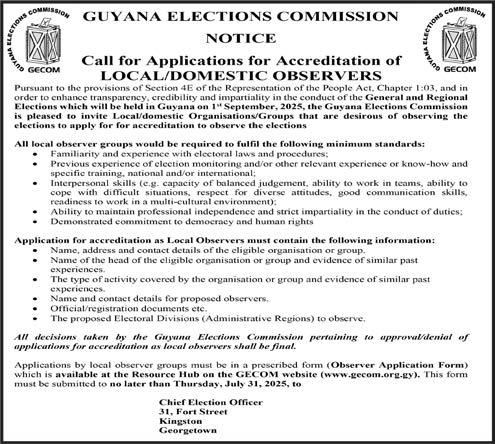



From page V highlight, offering everything from balata sculpting and African drumming to yoga, Zumba, and capoeira. At night, the venue transforms into a lively performance space, culminating in the now-beloved campfire jams. “We always end each night with a campfire jam where anyone can get involved,” said Mendonca. “Come to the festival with an adventurous spirit and develop new friendships through a shared human experience.”
This year’s festival will be held at Manari Ranch from October 24 to 26, and though the list of performers is still being finalised, the lineup is expected to include a mix of talent from Surama, Lethem, Georgetown, and potentially Trinidad and Grenada.
Support from both local and international partners has played a vital role in relaunching the festival. Sponsors such as Banks DIH, Oasis Café, Wilderness Explorers, and Baganara Island Resort have provided backing, and a fundraising auction hosted by British High Commissioner Jane Miller and her husband Dr. Robert Miller is planned for July 17.
The Ministry of Tourism has also come on board with a small but significant grant.
It’s a reflection of growing recognition of the festival’s potential to boost community tourism and provide sustainable economic opportunities. Behind the scenes, a dedicated group of volunteers keeps the vision alive.
Mendonca credited several of them, including artist Nigel Butler, chocolatier Andrew Campbell, radiologist Ramona Chanderballi, and social media coordinator Brittany Singh, among others.
One of the most exciting long-term plans is the formation of a Rupununi Music and Arts Festival Ensemble, a group of young musicians trained to build their own instruments, play them, and perform at the festival and beyond.
As October draws near, anticipation builds, not just for the music or the workshops, but for the sense of community, the connection to the land, and the opportunity to take part in something meaningful. For those ready to experience the magic of the Rupununi; its songs, its stories, its people, this year’s festival promises a homecoming like no other. More information and updates on the lineup will be available on the festival’s Facebook page and at www.rupununifestival.com
From page XVII dollars more, they may attract an employee who felt undervalued in their previous workplace. Every employee is important, and employers must treat them as such and ensure they feel it.
Vacation
One of the key differences between people and machines is that humans require time to rest. The best individuals deserve rest, and the organisation must ensure that every employee is provided with that opportunity.
Delegation
Supervising officers who delegate tasks to others help develop their employees’ skills. Once subordinates get sufficient practice with certain responsibilities, they will improve and, in time, may be able to take on full responsibility.
Supervising officers should aim to delegate more, which in turn may give them time and space to learn new skills themselves. When delegation is practised, the organisation is more likely to have multiple capable individuals as needed when the need arises.
Some may ask why delegation is important. The diagram below provides some answers to this question.
For More Information
To learn more about Geary Reid and his books, use the following contacts:
• Amazon: Geary Reid
• Website: www. reidnlearn.com
• Facebook: ReidnLearn
• Email: info@reidnlearn.com
• Mobile: +592-6452240







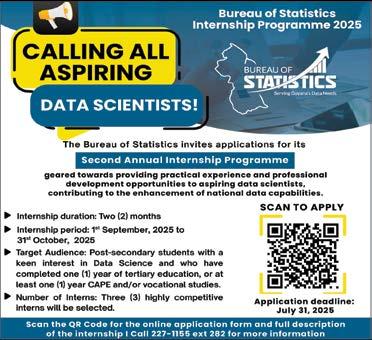











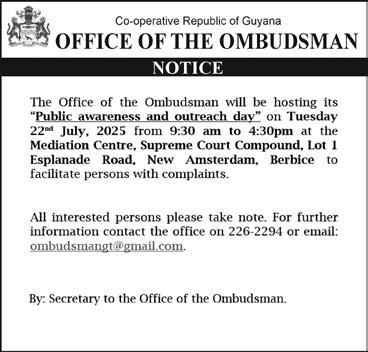

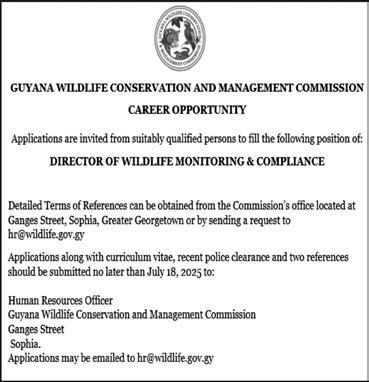

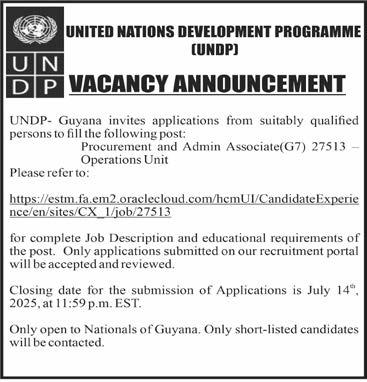
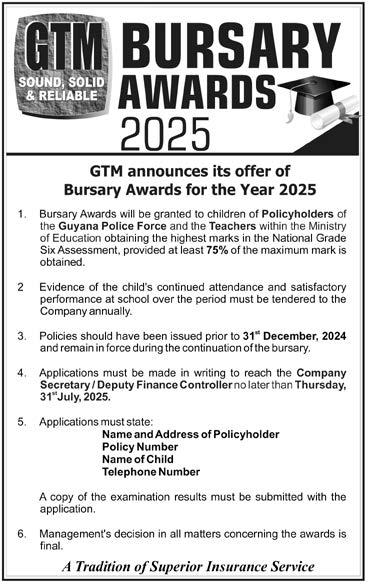









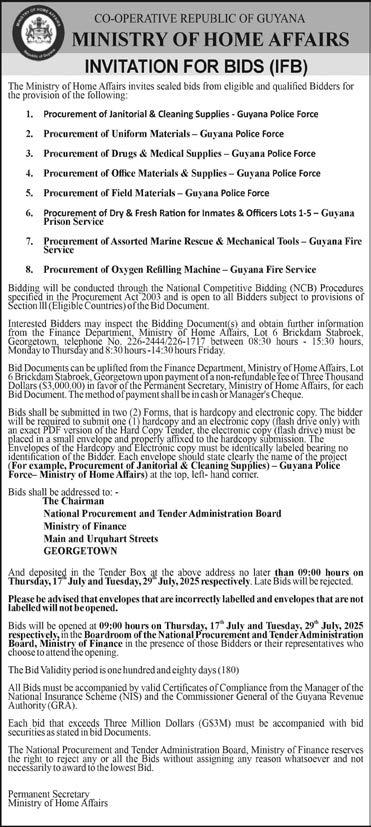

JULY 13, 2025
Reading Comprehension
Note: You have looked at what reading comprehension is, and learned about
Welcome dear reading friend. We now look at reading comprehension. 1) Here you need to understand, process, interpret the written text, and integrate its contents with personal knowledge. 2) Perceive the meaning of words and sentences, the vocabulary and knowledge with ease. 3) Determine the central idea, theme or message, and the details or information that supports it. 4) Draw inferences and conclusions through deduction to make predictions based on the text, even if they are not explicitly stated. Be wise. Love you.
understanding, processing, interpreting of the written text, and integrating its contents with personal knowledge. You also looked at perceiving the meaning of words and sentences, the vocabulary and knowledge with ease.
The following passage has questions that you should be able to respond to quite easily.
Instruction: Read the

passage carefully and then answer the questions set.
One stop brought us into the family sitting-room, without any introductory lobby or passage, they call it here ‘the house’ pre-eminently.
It includes kitchen and parlor, generally; but I believe at Wuthering Heights the kitchen is forced to retreat altogether into another quarter: at least I distinguished a chatter of tongues, and a clatter of culinary utensils, deep within; and I observed no signs of roasting, boiling, or baking, about the huge fireplace; nor any glitter of copper saucepans and tin cullenders on the walls.
One end, indeed, reflected splendidly both light and heat from ranks of immense pewter dishes, interspersed with silver jugs and tankards, towering row after row, on a vast oak dresser, to the very roof. The latter had never been under-drawn: its entire anatomy lay bare to an enquiring eye, except where a frame of wood laden with oatcakes and clusters of legs of beef, mutton, and ham, concealed it. Above the chimney were sundry villainous old guns, and a couple of horse-pistols: and, by the way of ornaments, three gaudily-painted canisters disposed along its ledge.
The floor was of smooth, white stone; the chairs, highbacked, primitive structures, painted green: one or two heavy black ones lurking in the shade. In an arch under the dresser reposed a huge, liver-coloured bitch pointer, surrounded by a small swarm of squealing puppies; and other dogs haunted other recesses.
1. Describe ‘the house’ pre-eminently in about two sentences.
2. Give a short description of the following parts of the house: kitchen, chimney, fireplace.
3. Give a short description of this house furnishing: tongues in connection with the huge fireplace.
4. a) Why ‘clatter’ of culinary utensils? b) Why “clusters” of legs of beef, mutton, ham? Try to hazard one reason or two for each usage.
Though the mills of God grind slowly, yet they grind exceeding small.
FRIEDRICH VON LOGAU (1604-1655) Sinngedichte (1653), III.ii.24 (tr. H.W. Longfellow)
5. Can you tell what the following styles of cooking really are? Roast, boil, bake.
6. Find three house utensils, then name them, and say what they look like and their uses.
7. Describe these to someone who has never eaten them: beef, mutton, ham, oatcakes.
8. Write a summary of the passage.
GRAMMAR
Punctuation of sentences
Note: Remember these bits of encouragement? You promote a better relationship between your material and your reader if you write using well punctuated scripts which bring with them clarity of expression and effective communication. Your intended meaning will flow at will effectively.
This exercise is yet another reminder specially selected to improve the sentences in your stories and quotations. Just be mindful to guide your readers by correctly indicating pauses, stops, or breaks between words, phrases, and sentences; also writing quotes, and contractions to convey meaning.
Instruction: Read the following quotations. They have not been completely punctuated. Complete their punctuation. Each quote has between one to three missing punctuation points.
1. O Thou who changest not abide with me
2. In this book I have just made up a bunch of other mens flowers
3. People wish their enemies dead… but I do not I say give them the gout give them the stone
4. What the devil would he be doing in this gang
5. Yes in the old days that was so but we have changed all that
6. Population when unchecked increases in a geometrical ratio subsistence only increases in an arithmetical ratio
7. No time like the present 8. Thats the way the money goes
9. A rare bird on this earth like nothing so much as a black swan
10. Genius is one per cent inspiration and ninety nine per cent perspiration
THE POEM
Poem pertaining to the joy of nature: a poet’s impression
Read these two stanzas from William Wordsworth’s poem, “I Wandered Lonely as a Cloud”, and then respond to the questions set below them.
I Wandered Lonely as a Cloud
That floats on high o’er vales and hills,
When all at once I saw a crowd,
A host, of golden daffodils:
Beside the lake, beneath the trees,
Fluttering and dancing in the breeze.
Continuous as the stars that shine
And twinkle on the milky way, They stretched in never-ending line
Along the margin of a bay.
Ten thousand saw I at a glance,
Tossing their heads in sprightly dance.
1. What exactly have the daffodils impressed upon the poet?
2. Is he walking along Turn to page XXXIX

TODAY, it is estimated that over 250 thousand Guyanese suffer from chronic bad breath (halitosis). Many of these people are unaware of their offending breath until somebody dares to tell them. But once they are aware that they have the problem, they will usually do anything to avoid the embarrassment that it causes. The best place to start is by visiting a dental professional for an examination.
It is accepted that disorders of the oral cavity cause up to 85–90% of all cases of halitosis. Some of the more common causes include a dry mouth due to a lack of saliva flow, especially during sleep, an unclean tongue, decayed teeth, calculus on teeth, dirty dentures, and smoking. Most of these factors share a commonality in increasing bacteria in the oral cavity. These bacteria produce compounds such as hydrogen sulphide, methyl mercaptan, and dimethyl sulphide.
Collectively, they are known as volatile sulphur-containing compounds or VSCs. These compounds are responsible for bad breath.
Many people believe that mouthwash is the solution to bad breath. However, a recent concept in dentistry classifies mouth rinse as an oral deodorant. It may be just as effective as using perfume as a substitute for bathing.

From page XXXVIII the countryside or in a city?
Give some words and phrases which help you understand where he is walking?
3. Is he walking alone or with someone? Support your response.
4. How has this happened to him all of a sudden?
5. Give the rhyming words in both stanzas. 6. What is the central message of the poem so far?
7. What does “a host of
However, the additives certainly enhance its effectiveness beyond being just cosmetics. For bad breath, at least, people have considerable confidence in the use of mouthwash, but can that be justified? Perhaps just as a temporary measure, but certainly not as a cure.
Incidentally, if you must use mouth rinse as an emergency measure, try swishing with warm salt water. You can create this by mixing a quarter to a half teaspoon of salt to 8 ounces of water.
All one must do is look at the amount of money spent on various mouthwashes, flavouring agents, mints and other substances to see that halitosis is a serious social problem.
Studies show that disorders of the oral cavity are responsible for most instances of bad breath. However, it is clear when you examine the numbers that companies producing mints and sprays are the ones providing bad breath treatment, not the dentist.
Bad breath is a condition with many different causes, and although it is most often associated with oral problems, it can also be a symptom of a serious underlying disease. One of the best examples of this is diabetes.
Since oral factors are the primary cause of bad breath, eliminating these factors should be the first step in the treatment approach. The following steps are recom-
mended:
1. Improve oral hygiene techniques.
2. Control gum disease (periodontal disease).
3. Perform all necessary dental care.
4. Increase salivary flow.
5. Patients who wear dentures or partials need special home care instructions. Clean them thoroughly every day and soak them in mild vinegar when not in use.
6. Patients wearing removable appliances also require special oral hygiene instructions.
7. For individuals who consume spicy foods like garlic and onions, excellent oral hygiene may not be sufficient to eliminate bad breath.
Finally, bad breath can be a symptom of a medical
condition which has nothing to do with your oral hygiene. These conditions include respiratory infections, infections of the nose or lungs, chronic bronchitis, post-nasal drip, chronic sinusitis, and digestive, liver, and kidney disorders.
golden daffodils” mean?
8. What do you think the golden colour and appearance did for the daffodils and the writer?
9. a) When do daffodils usually appear in England’s Lake District as depicted in the poem? b) Support with three bits of evidence.
10. a) Point out a simile from one of the two stanzas. How effective is it? b) Explain three levels that it can resonate with readers.

